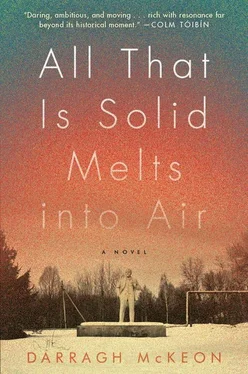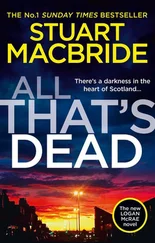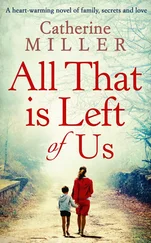It took Artyom’s father fourteen days to die.
HIS FACE WAS swollen and, when the shock of seeing him had faded and Artyom looked closer, he noticed that the glands under his father’s ears were sticking out like small, round pebbles. When they came back the next day, they were the size of eggs. The day after that, he was alone. Each man had been placed in a separate room. They were banned from going into the corridor, talking to each other. So they communicated by a series of knocks. Dash-dot, dot-dot. Remembering the code from their military training.
Artyom, Sofya, and his mother stayed in the nurses’ quarters behind the hospital. On their first night in the hospital, the attendants tried to remove them from the common room where they were settling down to sleep. But they saw the steely determination in Artyom’s mother’s eyes. These people wouldn’t be moved.
The nurses’ apartment was a small room with a double bed, a gas ring for cooking, a fridge in the corner, and a shower room. They were almost alone in this building too. Now all the nurses lived on the bottom floor, the rest had moved out.
A few days later there were no nurses at all; it was the militia that cleaned the bedpans, changed sheets, administered medicines. Artyom asked one of them where the nurses had gone and was told that they had refused to do the work. It was too dangerous.
How sick do you have to be to frighten a nurse?
Small black lesions developed on his father’s tongue. A day later, black spots appeared all over his body, each the size of a five-kopeck coin.
After that, Artyom and Sofya weren’t allowed into the hospital.
Artyom pieced together what had happened. His father told him some things. Yuri talked to him too. Sofya sometimes answered his questions. And, after his father died, his mother opened up a little. There was no longer any reason to protect him.
In Pripyat, when everyone was being evacuated, some officers gathered the men together, told them it was their duty to make their homes safe again. It was up to them to clear the damage. No one objected, glad of the opportunity to help.
Artyom’s father was assigned to work on clearing the forests. The other men asked to join him. They drew attention to their experience of working together in the kolkhoz and managed to get official approval.
They lived in tents in the forest; Yuri said they felt like partisans during the war. Soon the forest turned red, all the leaves a bright shade of crimson. Yuri remembered Artyom’s father picking up the red leaves on the forest floor, saying: “Mother Nature is bleeding.” There were tiny holes in them, as though caterpillars had run amok. They were given dosimeters but threw them away.
“Either we do the work, or we don’t do the work, and we’ve decided to do the work.”
This is what they said.
They chopped the trees. Cut them down with chainsaws. They sliced them into metre-and-a-half pieces and packed them in cellophane and buried them in the earth. At night they drank; they had been told vodka helped with the radiation. “Vodka,” they laughed, “helps with everything.”
The troops flew a flag over the reactor: two days after the accident they put it there as a symbol of pride, endurance. Five days later it hung ragged, eaten by the air. A day after that, a new flag, turning in the breeze. A week after that one, another new flag. Everyone tried to avoid looking at the flag. The flag was disconcerting.
They worked on.
One by one the chainsaws died. Nobody could understand why; they were in pristine condition, their mechanisms just wouldn’t respond. They were all replaced. Each man worked with a new chainsaw. These died too. Eventually, they took axes to the tree trunks, and at night they needed to drink even more to dull the pain of their raw shoulders. “Backbreaking work chopping down tree after tree by hand.” This is what Yuri said, and Artyom didn’t doubt it.
They shot animals they came across in the forest and roasted them over a spit and ate them. Supplies were readily available, but they grew tired of tinned food after the first week. Roasting an animal on a spit lends itself to conversation. After a few weeks someone noticed that he couldn’t smell the meat as it roasted, and the other men realized that they couldn’t smell it either. Nobody slept well that night.
The forest turned orange, and they said to each other, “Maybe Mother Nature’s blood is crusting over?”
One day they realized that the straw in their tents came from stacks near the reactor. They decided to clear out their tents, but after three nights sleeping on the bare ground, they brought it back in. Yuri said he made a joke, “Better to die of radiation than pneumonia,” but nobody laughed. They stopped laughing after the first few weeks, after the chainsaws broke down again.
One night it rained, and in the morning the water in the puddles was green and yellow, like mercury.
All around them, soldiers and men like themselves were burying everything. Gennady Polovinkin came up with a slogan: Fight the atom with a shovel. They said this to each other sometimes as encouragement. They said it ironically, bitterly, but also with defiance: let nature come and fight them, they each had an axe.
Artyom’s father told him he thought about him all the time. There were sparrows everywhere, littered dead on the ground. You couldn’t help standing on them, he said. They were covered in autumn leaves, even though it was still May. When he felt them underfoot he thought about that morning, out shooting. He prayed that Artyom was somewhere safe, somewhere clean, untouched by all this perversion of nature.
Artyom didn’t get to see his father when the tumours metastasized, not within his body but instead crawling to its surface, till they clasped his face, trailing his features like poison ivy. He didn’t get to see him when he was producing a stool thirty times a day, composed mainly of blood and mucus. When his skin started cracking on his arms and legs. When every evening his sheet would be covered in blood and Artyom’s mother would give the militiamen directions as to how to move him, and make sure her husband had fresh bedding for the night.
Artyom stayed with Sofya in the nurses’ quarters and roamed the city for fresh food, which they paid for with Maksim’s roubles and which they would bring back and make into soup, which their mother would take down when she came back to sleep for a few hours. She came back to sleep and to lie to her children, to pretend that their father wasn’t in any pain, just resting.
At the end she couldn’t lie anymore, not when his tongue fell out. Not when she’d hold a bedpan at the side of his bed to catch the blood which ran in rivulets from no particular place in his body. Not when he would cough and spit up pieces of his lungs, his liver, choking on his internal organs. She would never tell them that she’d look at him and see him crying out to her as though from the end of a long corridor. His eyes wailing their pain, like an infant when it can’t express its need, can’t make itself be understood. She couldn’t lie and couldn’t face her children, so she stayed there beside him, slept on the chair next to him, unable to touch him because it would bring too much pain. Her children brought the soup to the attendant at the reception desk, who would deliver it to a table at the entrance to the ward. They never asked to see their father. He belonged to their mother now.
IN THE CLEARING Artyom waits for the air to return to stillness, leaves vibrating from the thudding hooves. Around him, the bushes are dappled in red. Kalyna berries.
Those nights by the wireless, when the music had quietened and they watched shadows from the candlelight wrap around the plates and saucepans, his father would tell him stories. In one that they returned to often, the living and the dead were connected by bridges made from kalyna wood. They crossed easily from one side to the other, doing this so readily that after some time they could no longer distinguish between the two realms.
Читать дальше












